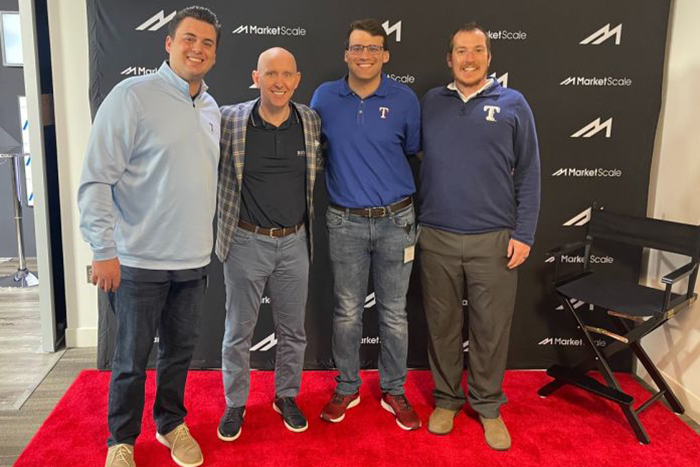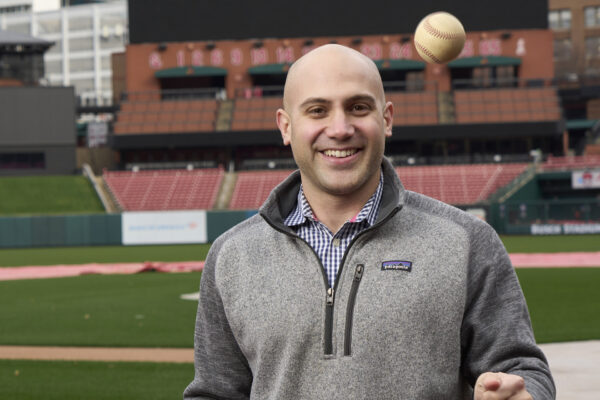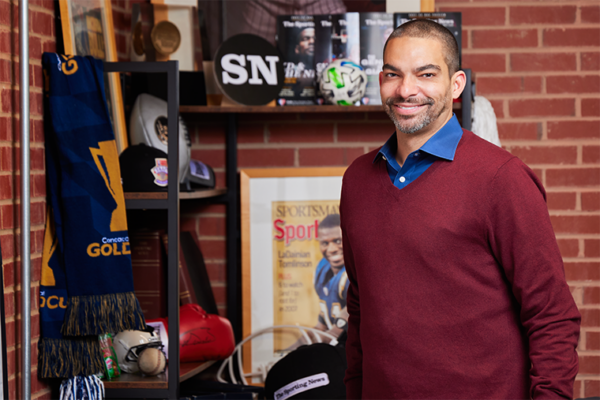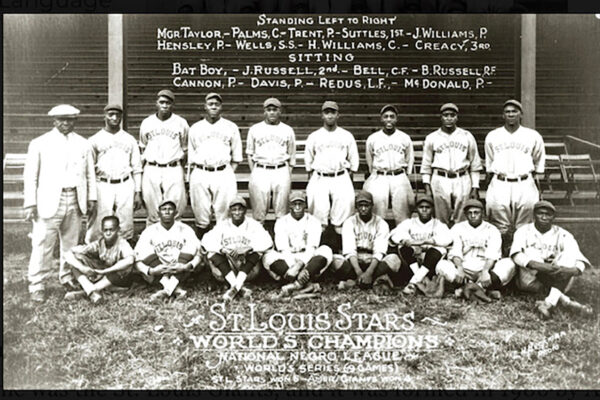
Last fall, the Texas Rangers tore through Major League Baseball’s postseason, winning a record 11 playoff road games en route to their first world championship. It might have seemed like the franchise’s success came from out of the blue — particularly in defeating the heavily favored cross-state rival Houston Astros in the American League Championship Series. But not to three Washington University in St. Louis alumni, who have key roles in the Rangers organization and have been working toward this goal for years.
Alexander Booth, AB ’15, studied mathematics in Arts & Sciences with an emphasis on statistics. Today, he is the assistant director of research and development in baseball operations. In this role, Booth leads initiatives and strategies to modernize the team’s data platform — with regard to the influx of new technology, artificial intelligence and data availability in baseball — throughout all levels of the game to help the team make better decisions.
Sam Linker, AB ’20, studied economics in Arts & Sciences and earned a minor in sports business. As an analyst in the amateur draft division, he evaluates top high school and college players for the Major League Baseball amateur draft each year and maintains and tunes the models and advanced metrics that the Rangers use to evaluate amateur players.

Zack Kessinger, BSBA ’15, JD ’18, was the starting first baseman for WashU’s varsity baseball team from 2012–15. While a Bear, he became the all-time leader in career RBIs and in games played — records he still holds. Today, Kessinger uses his expertise off the field as the Ranger’s associate counsel. In this role, he negotiates sponsorship agreements, vendor contracts, real estate agreements, loan documents and more. He’s also responsible for providing legal advice to executive and senior management in the organization on a broad range of legal matters, compliance issues, complex transactions and commercial contracts.
Below, Booth, Linker and Kessinger reflect on how their WashU education helped them land dream jobs with the team; their favorite memories from the championship season; and share advice for current students who want to follow their path.
How did your WashU education and experience prepare you for a career in Major League Baseball?
“My education through classes in applied mathematics, coding and business helped me understand tangibly what it means to make a data-driven decision in the real world,” Booth says. “You don’t just write a program or look at statistical distributions for the sake of it. At the end of the day, all these technologies work together to help you make more informed decisions regarding the business, whether it’s on player acquisition or development, marketing or season ticket sales. Making better decisions, finding that signal in the noise of today’s big-data environment, is what drives business value and results in a World Series win and a high-caliber organization.”
The connections made at WashU were instrumental for Linker and Kessinger, too.
“The sports business program helped put me in touch with the right people to start my career in baseball analytics,” Linker says. “During my sophomore year, I connected with Alexander Booth, who was already with the Rangers, and he provided me valuable advice to make myself an appealing candidate for baseball jobs.”
“WashU’s career center offers tremendous resources for you, and so does our extensive alumni network around the world,” Kessinger says. “While earning good grades is certainly important, obtaining meaningful experiences and connections can be even more valuable. The lasting connections that I made with friends, teammates, professors, coaches and staff from WashU — including [Patrick] Rishe, [director of the Sports Business Program and professor of practice in sports business], who I met in March 2023, long after I left the university — have been so valuable to me.”
What was your favorite memory from the 2023 season?
“The feeling of winning a World Series cannot be described in words,” Linker says. “Looking back, the two weeks between Game 6 in Houston [during the American League Championship series] and Game 5 of the World Series feel like a blur because there was so much emotion and celebration. My favorite memory is, without a doubt, being part of the World Series championship parade. Seeing the hundreds of thousands of people who showed up gave me a feeling that will never be matched. Getting to be on a float and celebrate with the rest of my colleagues in Baseball Operations was the ultimate cherry on top of the unbelievable ride that was the 2023 season.”
“The entire organization came together for this championship, and the tireless work was worth it to see the joy and celebration of our community and fanbase during the parade after the win.”
Alexander Booth
“As someone who grew up a Rangers fan and has been with this organization through some poor MLB seasons, to have played a part in this historic moment was surreal,” Booth says. “Everyone in the front office played a role, whether it was the amateur scouts acquiring guys like Evan Carter and Josh Jung, or those who secured the international acquisition of Leody Taveras, those making trades at the deadline for Jordan Montgomery and Max Scherzer, or the player development guys building our players up to peak performance over months and years. The entire organization came together for this championship, and the tireless work was worth it to see the joy and celebration of our community and fanbase during the parade after the win.”
Kessinger got to drive one of the trucks in that World Series parade, chauffeuring Rangers bench coach Donnie Ecker and assistant hitting coach Seth Conner and their families in front of some 750,000 screaming fans in Arlington, Texas. But he gets emotional recalling Game 5, where he was in attendance with his wife, Erin, while clutching a picture of his late mother, Rosalind Ellis, PT ’90, because the day he got the job offer from the Rangers was his mom’s birthday.
“I will never forget that moment, but more importantly, I was able to share that experience with my wife,” Kessinger says. “It was an emotional roller-coaster of a season, but the Rangers proved the baseball experts wrong. I couldn’t help but wonder — what were the odds that I receive an offer to work for the team on my mother’s birthday and the Rangers win a World Series during my first year with the front office? That’s no coincidence — I know I received some help from my Guardian Angel.”
What advice do you have for current students who want to pursue careers in sports business?
“Network, network and network,” Kessinger says. “Don’t be afraid to put yourself out there — attend sports-related conferences, summits and other events around the country and introduce yourself, because who knows — you might end up working with, or opposite, these individuals in the future. The sports world is a tight-knit community. Be a sponge and learn as much information as possible. Don’t be afraid to ask questions.”
“Just go for it,” Booth says. “Find a dataset, tell a data story, make business impact decisions and showcase your passion for this area of sports.
“Further, stay abreast of innovation,” Booth says. “Learning does not begin or end in the classroom. Read up on new technologies and insights. Understand how businesses outside of sports are making decisions. Sports business plays catch-up to general industry – and being knowledgeable about the changes and deployments in other industries will quickly snowball into value creation within a sports franchise.”


